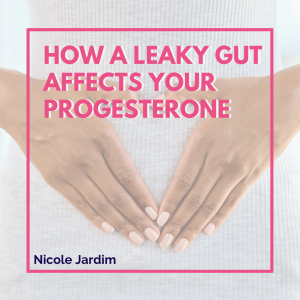I could probably write an entire book just on the importance of gut health & its connection to hormones and the menstrual cycle.
In fact, my original chapter on gut health was 60 pages long! 😂
But today I want to focus on the gut-progesterone link.
Dysbiosis is when there is an over abundance of pathogenic or opportunistic bacteria and/or a reduction of friendly bacteria in the gut.
A compromised gut microbiome can lead to the production of Lipopolysaccharides (LPS for short).
These are endotoxins, released from the outer cell walls of pathogenic bacteria, also known as gram-negative bacteria (e.g. E. coli or salmonella, which I’m sure you’re all familiar with).
When a person has a leaky gut, LPS can travel across the gut barrier and enter the body.
One example? The ovaries.
LPS can directly affect the ovaries by prompting an inflammatory immune response and inflammation in the ovary, leading to impaired follicular growth and activity. It also has an impact on the corpus luteum. This decreases estrogen and progesterone production, but particularly progesterone since the corpus luteum is the sole producer of this hormone.
The disruption of the normal functioning of the ovarian follicle and the corpus luteum can cause all the problems associated with lowered progesterone, like luteal phase deficiency and short cycles, PMS, heavy periods, breast pain, and fertility troubles. There is also animal study evidence that supports LPS as a cause of primary ovarian insufficiency or premature ovarian failure. 😞
If you’ve been wondering why we have such an epidemic of low progesterone production & fertility problems in our society, it might have something to do with our GUTS.
You can read more about all the ways to support your gut health in my book, Fix Your Period (Week Three: Fix Your Gut, Fix Your Hormones).

Endometriosis, Histamine and Gut Health
Endometriosis is a complex inflammatory disease in which tissue that is similar to the kind that lines the uterus, grows outside the uterus. More on


